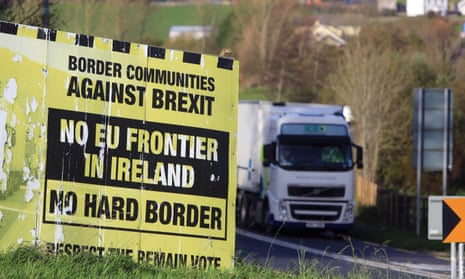Throughout his career, Gerry Adams relentlessly singled out the British government for the blame in Ireland’s troubles. In truth, the responsibility for Northern Ireland’s miseries was widely shared, not least with the IRA and Sinn Féin, of which Mr Adams has been for so long the chief strategist. Yet it is ironic that the Sinn Féin leader announced his retirement from frontline politics at the weekend. For Mr Adams is stepping down at the very moment when a British government is unambiguously the sole cause of a massively hostile act against Ireland, north and south, in the form of a hard Brexit.
From start to finish, Conservative Brexiters have shown that they simply could not care less about Ireland. In the referendum campaign, few gave even a passing thought to the impact of a leave vote on the relationship between Northern Ireland, the rest of the UK and the republic. When the vote went their way – though they lost in Northern Ireland – the Brexiters then gave bland assurances that the decision would make absolutely no difference to the island’s soft border, the legacy of the peace process, or north-south and east-west cooperation.
This was and is nonsense. The Irish government warned immediately that serious difficulties had been created by the vote and by Theresa May’s wish to leave the single market and customs union. Dublin cannot be faulted for the reasoned and patient way it insisted these issues would have to be solved. In practice, though, none was taken seriously in London. The peace agreements had been the fruit of long years of cooperative work. But the neighbourly mentality that made them possible has gone missing in London.
Q&AWhy is Dublin opposed to the idea of a hard border?
Show
Ireland’s taoiseach, Leo Varadkar, has been much more sceptical than the UK about the potential for avoiding border posts via virtual checks on importers. Whilst agreeing with British ministers and EU negotiators that it is inconceivable for there to be a return to a hard border with the north, Dublin argues that the best way for the UK to achieve this would be by permanently remaining in a customs union with the EU and seeking single market membership like Norway through the European Economic Area. The UK has conceded that some of this will be necessary in its interim phase after Brexit, but hopes clever technological solutions can allow it have looser economic links in the long run. Varadkar is not alone in being sceptical about whether such a cake-and-eat-it customs and trade strategy is viable.
The truth is that the Brexit wing of the Tory party does not take Ireland into account. This failure is compounded by Mrs May’s foolish pact to construct a majority with the votes of the Democratic Unionist party. Once again, no thought was given to the effect on relations with the republic and the European Union. The bland assurances have continued right up to the present, even though the EU has made absolutely clear that “sufficient progress” on the Irish border issue was one of the three preconditions – along with reciprocal rights for EU and UK citizens and a financial deal – to permit the next phase of talks on future relations.
If good neighbourliness, a feeling for the history of these islands and a clear understanding of the UK national interest truly informed the government’s approach, Mrs May would have said from the outset that Britain should remain in the EU customs union. This would have benefited manufacturers and jobs, and would have largely solved the Irish border problem. Goods would be able to travel across the Irish border without the need for checks and delays – and organised crime, perhaps with paramilitary connections, would have no foothold. Above all, the civic healing between the republic, the north and Britain would continue uninterrupted. This is still what should happen.
The moment of truth at the December EU council is now less than a month away. In marked contrast to the Irish government, which has warned that the governments are diverging not converging, the British government position still lacks political or moral seriousness. This is a national disgrace for Britain and it is time that more people in this country said so.
To much of Europe, Brexit appears to be an exercise in British self-harm, which it is. But in Ireland Brexit is potentially lethal too. If the UK government’s policy is followed, the border between north and south will become hard not soft, guarded not unguarded, controlled not free. The consequences of this change could be deeply destructive to the peace process and secure life. But, even more than that, they would be a gratuitous act of hostility towards the Irish economy and people. Even if the history did not matter, that would be unforgivable.
